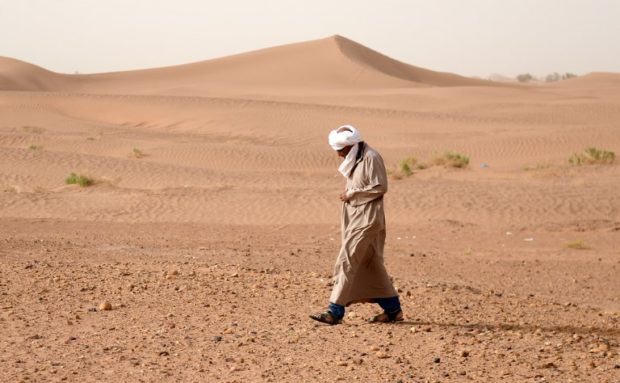Meteorite hunters seek to strike it rich in Moroccan desert

A meteorite hunter searches for rocks near the oasis town of Mhamid el-Ghizlane, in southern Morocco’s Sahara desert province of Zagora.
Equipped with a “very strong” magnet and magnifying glass, retired physical education teacher Mohamed Bouzgarine says that discoveries “can be more valuable than gold”. / AFP PHOTO / FADEL SENNA
They roam Morocco’s southern desert, braving the searing heat to scour the undulating sands for bounty fallen from the sky.
These celestial treasure hunters are searching for meteorites to sell on a burgeoning international market.
Equipped with a “very strong” magnet and magnifying glass, retired physical education teacher Mohamed Bouzgarine says that discoveries “can be more valuable than gold”.
The price “depends on the rock’s rarity, its shape and its condition”, the 59-year old adds, sporting a dark blue tracksuit, lighter blue scarf and sunglasses.
“Rocks coming from Mars are very expensive, sometimes as much as 10,000 dirhams (around $1,000, 900 euros) per gram,” he says.
Article continues after this advertisementBouzgarine stops in front of a hollow, hoping it could be a crater formed “very long ago” by extraterrestrial matter.
Article continues after this advertisement“It’s a first sign,” he says, ready to get down to work, in the township of M’Hamid el Ghizlane.
For four years now, he’s been sifting rocks in the sand, inspecting them for telltale signs of burn incurred during fiery journeys through the atmosphere.
And while he is yet to strike it lucky, the success of some of his hundreds of peers provides the stamina to plod on.
Rich hunting grounds
Likewise Abderrahmane, a 48-year-old paramedic who is spending his vacation searching for meteorites.
Others “have made a lot of money… one meteorite hunter found and sold 600 grams for 7,500 dirhams (660 euros, $780) per gram,” Abderrahmane says, dressed in a blue safari suit.
“From the 2000s, all the nomads started to look for rocks,” he says.
A few foreign specialists are also drawn to the quest for extraterrestrial fragments in the desert landscapes of Erfoud, Tata and Zagora.
These parts of southern Morocco are rich hunting grounds, as the wind uncovers meteorites and their black hue is easy to spot against the near-white sand.
“At least half the scientific publications on the subject are made on the basis of meteorites collected in Morocco,” geochemist Hasnaa Chennaoui Aoudjehane tells AFP.
Desert zones are “favourable to the accumulation of meteorites, there is no vegetation… (and) … the risk of alteration is low,” adds Aoudjehane, who teaches at Casablanca’s Hassan II university.
For scientists, these rocks harbour valuable information about the formation of the solar system 4.5 billion years ago, as well as the planets and their internal composition. One in every five meteorites is valuable.
Demand from scientists and specialist brokers has raised prices and inspired meteorite hunters.
Unlike other countries, where the state stakes a claim, there is no legal framework governing discoveries in Morocco, so it’s a case of “finders keepers”.
While several meteor showers have occurred in Morocco in recent years, a bonanza known as the “black beauty” was the most lucrative.
‘Like playing the lottery’
In 2011, fragments of this Martian landing fell in southern Morocco’s Tata region, setting in motion a scramble that saw seven kilograms of fragments recovered.
The haul fetched prices of between $500 and $1,000 per gram.
Back on the desert plains, it can be frustrating work, requiring a lot of patience.
Twenty days into his “holiday”, paramedic Abderrahmane has been “searching for fragments” without finding anything of note, he says.
But he remains undeterred.
“It is a question of luck — it’s like playing the lottery,” he smiles.
And he knows how he will handle a major find.
“The sale is made discreetly — it is necessary to get the vendor’s confidence,” he says.
Transactions are also made online, in specialist forums and even on classified advertising sites.
The most valuable finds are sold at auction in Paris or New York.
“What one finds in the (local) souks are just odds and ends,” says Abderrahmane.
And there’s not much money to be made at the bottom end of the meteorite sales chain.
Slimane, an old man with a white beard and blue turban, sits under a tent in a souk in M’hamid, surrounded by coloured fabrics, outdated jewels and old coins.
He dips into a leather satchel, retrieving some rocks accumulated over the years.
But they’re “not worth much”, he confesses.
“I have not risen above penury through rocks,” he laments, arms raised to the sky.